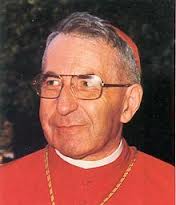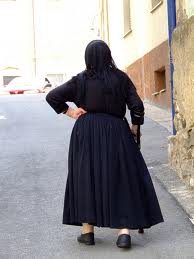|
Take it from me, since I was around a Conclave, the Vaticanologists do not know what they’re talking about when they predict the new pope.
Better you should consult a Roman housekeeper from Sardinia, named Grazia. She will know. I discovered this in August of 1978, when I was dispatched to Rome upon the death of Pope Paul VI. (The first thing I learned is that journalists in Rome do not refer to the popes by number but by their original family name; Montini had just passed, for example.) Every expert was talking up the most famous candidates – Baggio, Maldini, Baresi, Del Piero. (Those are actually soccer names; I just wanted to see if you were paying attention. The point was, the favorites were all Italian.) As soon as I got to Rome, the Times promptly went on strike. Our bureau chief departed for, I think, the beaches of Sardinia, lending his flat in the Piazza Navona to me and a colleague and our ladies. This gift included his Sardinian housekeeper, well under five feet tall, named Grazia. Her sister, also under five feet tall, was visiting. They wore black all the time. Since I was the only one of our group who spoke any Italian, Grazia ran the household through me, but mostly she divulged her predictions for the upcoming conclave: Signore Giorgio! Cardinale Luciani! Venezia! Famiglia Socialista! Uomo di Popolo! I recited to her the names of all the Italian favorites. She wagged her index finger at me like a defender telling the referee not to give a yellow card. Since I was on strike, my wife and I took a side trip to Vienna and Budapest. We came back when the conclave began. Grazia repeated her assertion that the Venetian cardinal would win. Then one afternoon, while I was taking a blessed nap with the shades drawn, I could hear bells ringing all over Rome. I heard bustling in the hallway. Grazia and her sister, in their finest black, were heading off to church to pray for the new pope. Grazia paused in the doorway and delivered her punch line: Signore Giorgio! Cardinale Luciani! Venezia! Famiglia Socialista! Uomo di Popolo! Albino Luciani lasted only a month. He was succeeded by a Polish prelate named Karol Jósef Wojtyla (whose name emerged from the first conclave; maybe I’ll tell that story in a day or two.) If you want to know the identity of the next pope, ask a Sardinian under five feet tall. Or her sister. 3/10/2013 04:26:50 am
Part of the charm of the expert class is in its willingness to persist in spite of the ongoing proof of their hubris. That's all of us, in some manner, isn't it? From the meteorologist with his charts to the sailor sniffing the salt spray, we all correctly predict the impending weather once in a while and then make those guesses our eternal triumphs. As for the cleaning ladies, God bless them, for they're no less insightful than the rest of humanity, but I'll leave it to you to bet the ranch on their opinions.
John McDermott
3/10/2013 09:08:24 am
Roncalli di Bergamo(Giovanni XXIII) rimane l'MVP, il più grande Papa di tutti tempi.
George Vecsey
3/10/2013 10:37:54 am
Vero. Il mio amico Leonard Koppett chiamava Giovanni XXIII "the yontif pontiff" -- Yiddish/English -- "the holiday Pope." Non fa senso, ma fa rima. GV 3/10/2013 10:58:02 am
George
George Vecsey
3/10/2013 11:10:41 am
Alan, does that work at the race track? GV 3/10/2013 03:09:08 pm
George
Brian Savin
3/10/2013 01:49:01 pm
Cool -- GREAT story!
Gene Palumbo
3/10/2013 04:11:03 pm
"I recited to her the names of all the Italian favorites. She wagged her index finger at me like a defender telling the referee not to give a yellow card."
Gene Palumbo
3/12/2013 01:04:30 pm
Hey, folks, George has a column in today's Times: "Where Are the Yankees I Loved to Hate." www.nytimes.com/2013/03/13/sports/baseball/where-are-the-yankees-i-loved-to-hate.html
Michael Green
3/16/2013 03:48:10 pm
Mr. Vecsey, when you were in Rome, you may have encountered Winston Burdett, one of the legendary Murrow Boys, who reported from there for more than 20 years for CBS News when it was CBS News. I will never forget watching the coverage in 1978 when Burdett said he thought there might be a non-Italian pope, possibly from behind the Iron Curtain. Uh ... he got it. Which is why the NBC producer at the time told his staff there were 112 cardinals going into the Curia and they should count; if 113 people went in, it meant Burdett had found a way in.
George Vecsey
3/17/2013 05:35:00 am
Dear Michael Green: I did not know Burdette. I was sent over for the first conclave but was home by the second one. When Luciani was elected, I went to the press conference at the NA Cardinals' residence, and heard Krol of Phila. allude to the Holy Spirit choosing a pope but then, and then -- I and I paraphrase -- Krol added that he had also been highly impressed with the cardinal from Krakow, that is to say, Karol Wojtyla. Burdett may have been there that day. I go into detail in my Musial biography (Musial was active in Polish circles, and had met Wojtyla.) Thanks for your enlightened note. GV Comments are closed.
|
Categories
All
|











